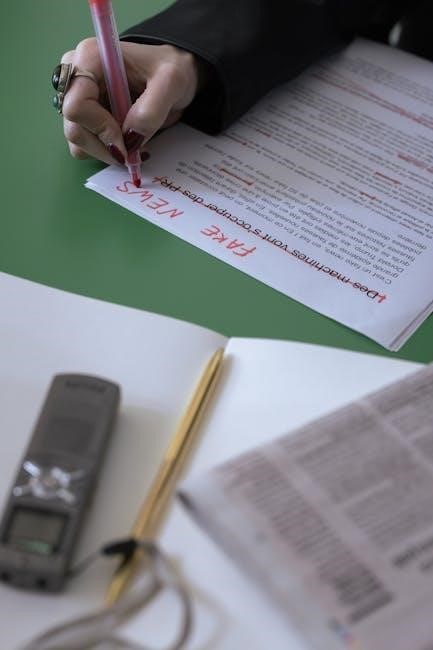Philosophically Correct Worksheet Answers provide a structured approach to understanding key philosophical concepts‚ encouraging critical thinking and logical reasoning. These answers demonstrate an understanding of Enlightenment principles‚ influential philosophers‚ and their contributions to modern governance. The worksheet includes multiple-choice‚ short-answer‚ and essay questions‚ designed to assess comprehension and analytical skills. It serves as a valuable resource for students and educators‚ promoting nuanced perspectives on complex philosophical ideas.
1.1 Understanding the Concept of Philosophically Correct Answers
Philosophically correct answers emphasize critical thinking‚ logical reasoning‚ and the application of key philosophical principles. These answers are designed to reflect nuanced perspectives‚ encouraging students to engage deeply with concepts rather than memorize facts. By focusing on Enlightenment thinkers and their influence on modern governance‚ philosophically correct answers promote an understanding of ethical‚ political‚ and metaphysical ideas. They require the ability to analyze complex scenarios‚ evaluate arguments‚ and apply philosophical theories to real-world issues‚ fostering a deeper comprehension of philosophical inquiry and its relevance to historical and contemporary thought.
1.2 Importance of Critical Thinking in Philosophical Inquiry
Critical thinking is essential in philosophical inquiry as it enables individuals to evaluate arguments‚ identify biases‚ and form well-reasoned conclusions. By fostering analytical skills‚ it encourages students to question assumptions and explore diverse perspectives; In the context of worksheet answers‚ critical thinking helps students move beyond mere memorization‚ instead engaging deeply with philosophical concepts. This approach not only enhances problem-solving abilities but also prepares learners to apply philosophical principles to real-world issues‚ making it a cornerstone of both academic success and lifelong intellectual growth.
1.3 Overview of the Worksheet Answer Key
The worksheet answer key provides model responses that illustrate a deep understanding of philosophical concepts and critical thinking. It includes answers to multiple-choice‚ short-answer‚ and essay questions‚ demonstrating logical reasoning and clarity. Designed to guide students‚ the key highlights key ideas‚ such as Enlightenment principles and influential philosophers. Additionally‚ it offers insights into applying philosophical theories to real-world scenarios. The key serves as a valuable resource for self-assessment‚ helping learners identify areas for improvement and refine their analytical skills in philosophical inquiry.

Historical Context of Philosophical Reasoning
The Enlightenment era laid the groundwork for modern philosophical reasoning‚ influencing key thinkers like Locke and Rousseau. Their ideas shaped political thought and governance‚ reflecting in foundational documents.
2.1 The Enlightenment and Its Influence on Political Thought

The Enlightenment‚ spanning from 1715 to 1789‚ was a transformative period where European thinkers challenged traditional ideas about power and governance. Philosophers like John Locke and Jean-Jacques Rousseau emphasized reason‚ individual rights‚ and the social contract‚ shaping modern political thought. Locke’s concepts of natural rights and consent of the governed influenced foundational documents‚ such as the Declaration of Independence. The era’s focus on logic and critical thinking laid the groundwork for democratic principles and the separation of powers‚ as seen in Montesquieu’s contributions. These ideas not only reshaped governance but also inspired future philosophical and political movements worldwide.
2.2 Key Philosophers and Their Contributions to Modern Governance
Philosophers like Locke‚ Rousseau‚ and Montesquieu played pivotal roles in shaping modern governance. Locke introduced the concept of natural rights and the idea that government derives authority from the consent of the governed. Rousseau’s social contract theory emphasized collective sovereignty‚ while Montesquieu’s separation of powers provided a framework for balanced governance. Their ideas influenced political structures globally‚ advocating for democracy‚ individual freedoms‚ and checks on power. These contributions remain foundational in contemporary political philosophy‚ guiding principles of justice and equality in modern states. Their works continue to inspire political reforms and underpin democratic systems worldwide.
2.3 The Role of Logic and Critical Thinking in Historical Documents
Logical reasoning and critical thinking are central to historical documents like the Declaration of Independence and The Social Contract. These texts employ rational arguments to justify political change‚ emphasizing natural rights and collective sovereignty. Enlightenment thinkers used logic to challenge traditional authority‚ advocating for governance based on reason and evidence. Their works demonstrate how systematic analysis can shape political ideologies and legal frameworks. By applying critical thinking‚ these documents established foundational principles for modern governance‚ influencing democracy and human rights. Logic remains a cornerstone of political discourse‚ guiding the interpretation of historical ideas in contemporary contexts.

Structure of the Philosophically Correct Worksheet

3.1 Types of Questions Included in the Worksheet
The worksheet features multiple-choice‚ short-answer‚ and essay questions. Multiple-choice tests foundational knowledge‚ while short-answer and essay questions assess critical thinking and depth of understanding‚ guided by the answer key.
The worksheet includes multiple-choice‚ short-answer‚ and essay questions. Multiple-choice questions test recognition of key concepts and ideas‚ while short-answer questions require concise explanations. Essay questions demand detailed analysis and critical thinking‚ often asking students to apply philosophical principles to real-world scenarios or historical texts. This variety ensures a comprehensive assessment of understanding‚ from foundational knowledge to advanced reasoning skills. The structure aligns with educational goals‚ fostering both retention of information and the ability to articulate complex ideas clearly and logically.
3.2 How to Approach Multiple-Choice and Short-Answer Questions
For multiple-choice questions‚ read each option carefully‚ eliminating obviously incorrect answers first. Focus on key terms and concepts from the worksheet. For short-answer questions‚ ensure a clear understanding of what is being asked. Reference key philosophical ideas and provide concise‚ relevant examples. Organize your thoughts logically‚ addressing each part of the question directly. Use specific terminology and avoid vague statements. Practice active reading and critical thinking to refine your approach‚ ensuring alignment with the principles of logical reasoning and Enlightenment thinkers’ ideas.
3.3 The Importance of Essay Questions in Philosophical Inquiry
Essay questions play a vital role in philosophical inquiry by allowing students to explore complex ideas deeply. They require the application of critical thinking and logical reasoning‚ encouraging original thought and analysis. Essays enable learners to connect abstract philosophical concepts to real-world scenarios‚ fostering a nuanced understanding of key principles. By articulating well-supported arguments‚ students demonstrate their mastery of Enlightenment thinkers’ ideas and the worksheet’s core concepts. This format also prepares learners for exams and academic success‚ as it hones their ability to express ideas clearly and coherently‚ aligning with the worksheet’s focus on logical reasoning and analytical skills.

Key Concepts in Philosophical Reasoning
Philosophical reasoning emphasizes ethics‚ metaphysics‚ epistemology‚ political philosophy‚ and aesthetics. These concepts guide critical thinking‚ logical reasoning‚ and the analysis of complex ideas in worksheet answers.
4.1 Ethics and Morality in Philosophical Discussions
Ethics and morality form the cornerstone of philosophical discussions‚ exploring concepts like right and wrong‚ justice‚ and human values. Philosophically correct worksheet answers often address these themes‚ encouraging critical examination of ethical dilemmas and moral principles. By analyzing the ideas of Enlightenment thinkers‚ such as Locke and Rousseau‚ students develop a deeper understanding of how ethical frameworks shape societal norms and governance. These discussions foster empathy‚ logical reasoning‚ and the ability to evaluate complex moral issues from multiple perspectives‚ aligning with the principles of natural law and human rights emphasized in foundational documents like the Declaration of Independence.
4.2 Metaphysics and Epistemology in Critical Thinking
Metaphysics and epistemology are foundational to critical thinking‚ addressing questions about reality‚ knowledge‚ and existence. Philosophically correct worksheet answers often explore these themes‚ encouraging students to analyze how beliefs are formed and justified. By examining metaphysical concepts like the nature of being and epistemological theories such as empiricism and rationalism‚ learners develop a deeper understanding of how knowledge is acquired and validated. These discussions align with Enlightenment ideals‚ emphasizing logical reasoning and the pursuit of truth‚ while fostering the ability to evaluate complex philosophical arguments and their implications for human understanding and decision-making.
4.3 Political Philosophy and Its Relevance to Governance
Political philosophy examines the principles underlying governance‚ justice‚ and authority. Philosophically correct worksheet answers often explore how Enlightenment thinkers like Locke‚ Rousseau‚ and Montesquieu shaped modern political systems. These philosophers emphasized natural rights‚ the social contract‚ and the separation of powers‚ influencing documents like the Declaration of Independence. Understanding these concepts is crucial for analyzing governance structures‚ evaluating policies‚ and addressing real-world issues. By studying political philosophy‚ individuals gain insights into the ethical and logical foundations of government‚ enabling them to engage critically with societal and political challenges.
4.4 Aesthetics and Its Role in Philosophical Debates
Aesthetics‚ the branch of philosophy dealing with beauty‚ taste‚ and art‚ plays a significant role in philosophical debates by exploring how humans experience and interpret sensory information. Philosophers like Kant and Hume examined whether beauty is objective or subjective‚ influencing broader discussions on perception and reality. Aesthetics also connects to ethical and metaphysical inquiries‚ as it questions how art reflects truth and morality. Worksheet answers often highlight these debates‚ encouraging critical analysis of artistic expression and its philosophical underpinnings‚ thereby fostering a deeper understanding of human experience and cultural values.

Influential Philosophers and Their Ideas
Influential philosophers like John Locke‚ Jean-Jacques Rousseau‚ and Immanuel Kant shaped modern governance and ethics. Their ideas on natural rights‚ social contracts‚ and moral philosophy remain foundational. Worksheet answers provide insight into their contributions‚ helping students understand their enduring impact on political and ethical thought through structured analysis and critical engagement.
5.1 John Locke and the Concept of Natural Rights
John Locke‚ a prominent Enlightenment philosopher‚ advocated for natural rights‚ asserting that all individuals are entitled to life‚ liberty‚ and property. His ideas influenced modern political thought‚ shaping the concept of governance based on consent. Locke argued that governments derive authority from the people and must protect these inherent rights. If a government fails to do so‚ citizens have the right to overthrow it. These principles are central to the Declaration of Independence and remain foundational in discussions of liberty and justice. Worksheet answers often highlight Locke’s emphasis on reason‚ individualism‚ and the social contract‚ showcasing his enduring impact on political philosophy.
5.2 Jean-Jacques Rousseau and the Social Contract
Jean-Jacques Rousseau’s Social Contract theorized that individuals submit to a collective will‚ trading natural freedom for civil liberty under a moral framework. He argued that legitimate authority derives from the “general will” of the people‚ not from divine or absolute rule. Rousseau’s ideas emphasized participatory governance and the moral transformation of individuals within society. His philosophy influenced modern democratic thought‚ advocating for sovereignty rooted in collective decision-making. Worksheet answers often explore Rousseau’s critique of inequality and his vision of a society where freedom and justice align‚ reflecting his enduring impact on political and ethical philosophy.
5.3 Montesquieu and the Separation of Powers
Montesquieu’s concept of the separation of powers revolutionized governance by dividing government into executive‚ legislative‚ and judicial branches. This framework prevents concentration of power‚ safeguarding liberty and preventing tyranny. Worksheet answers highlight Montesquieu’s influence on modern constitutions‚ emphasizing checks and balances. His ideas from The Spirit of the Laws shaped democratic systems‚ ensuring accountability and efficiency. By distributing power‚ Montesquieu’s theory promotes stability and justice‚ making it a cornerstone of political philosophy and a key topic in philosophical correctness‚ encouraging critical analysis of governance structures and their ethical implications. His work remains foundational in understanding effective governance.
5.4 Immanuel Kant and Moral Philosophy
Immanuel Kant’s moral philosophy‚ outlined in works like Grounding for the Metaphysics of Morals‚ emphasizes universal ethical principles. His categorical imperative argues that actions should be judged by their moral universality‚ not consequences. Kant’s theory distinguishes between hypothetical and categorical imperatives‚ advocating for duty-based ethics. Worksheet answers explore Kant’s influence on moral reasoning‚ highlighting his belief in human dignity and moral autonomy. His ideas shape modern debates on ethics‚ offering a framework for evaluating actions objectively. Kant’s philosophy remains central to understanding moral correctness and its application in critical thinking exercises.
5.5 John Stuart Mill and Utilitarianism
John Stuart Mill’s utilitarian philosophy posits that actions are morally right if they maximize overall happiness. His work‚ On Liberty and Utilitarianism‚ emphasizes individual freedom and the greatest happiness principle. Worksheet answers delve into Mill’s distinction between higher and lower pleasures‚ advocating for intellectual and moral pursuits. His ideas influence modern governance‚ balancing individual rights with societal well-being. Mill’s contributions to ethical theory remain foundational‚ offering a framework for evaluating moral dilemmas in philosophical inquiry and critical thinking exercises.

Declaration of Independence and Philosophical Principles
The Declaration of Independence reflects Enlightenment ideals‚ emphasizing natural rights‚ consent of the governed‚ and separation of powers. Philosophically‚ it draws from Locke’s natural law‚ influencing modern governance and individual freedoms‚ as seen in worksheet answers.
6.1 The Influence of Enlightenment Thinkers on the Document
The Declaration of Independence was profoundly shaped by Enlightenment thinkers like John Locke‚ Jean-Jacques Rousseau‚ and Montesquieu. Locke’s ideas on natural rights‚ life‚ liberty‚ and property inspired the document’s preamble. Rousseau’s social contract theory influenced the notion of consent of the governed‚ while Montesquieu’s separation of powers shaped the political framework. These philosophers’ emphasis on reason‚ individual rights‚ and limited government aligns with the Declaration’s principles. Their works provided the intellectual foundation for the document‚ ensuring its alignment with Enlightenment values and setting the stage for modern democratic governance.
6.2 The Concept of Consent of the Governed
The concept of consent of the governed‚ central to the Declaration of Independence‚ holds that governments derive their authority from the people rather than divine or absolute power. This idea‚ rooted in Enlightenment thought‚ emphasizes that rulers must act with the consent of those they govern. It challenges traditional notions of authority‚ asserting that legitimacy stems from the collective will of the people. This principle underpins democratic governance‚ ensuring accountability and aligning political power with the interests of the governed. It remains a cornerstone of modern political philosophy‚ shaping the relationship between citizens and their government.
6.3 The Role of Natural Law in the Declaration
Natural law‚ a philosophical principle rooted in Enlightenment thought‚ plays a pivotal role in the Declaration of Independence. It posits that certain rights‚ such as life‚ liberty‚ and the pursuit of happiness‚ are inherent and unalienable‚ deriving from a higher moral order rather than human legislation. This concept‚ influenced by thinkers like John Locke‚ provided the foundation for the Declaration’s argument for independence. By appealing to natural law‚ the Founders asserted that their cause was just and universally valid‚ transcending mere political expediency. This idea remains central to understanding the document’s philosophical underpinnings and its enduring influence on political thought.

Benefits of Using Philosophically Correct Worksheets
Philosophically Correct Worksheets enhance critical thinking‚ improve understanding of complex concepts‚ and develop analytical skills. They prepare students for exams and promote deeper engagement with philosophical ideas.
7.1 Enhancing Critical Thinking Skills
Philosophically Correct Worksheets are designed to enhance critical thinking by encouraging students to analyze complex ideas and evaluate evidence. Through structured questions‚ learners develop the ability to identify arguments‚ assess their validity‚ and form well-reasoned conclusions. This skill is essential for understanding philosophical concepts and applying them to real-world scenarios. By engaging with these worksheets‚ students improve their capacity to think independently and approach problems with a logical and nuanced perspective.
7.2 Improving Understanding of Philosophical Concepts
Philosophically Correct Worksheets help students grasp foundational ideas by breaking down complex theories into manageable parts. Through structured questions and model answers‚ learners explore key concepts like natural rights‚ social contracts‚ and ethical reasoning. These exercises connect abstract ideas to real-world applications‚ fostering a deeper understanding of philosophical principles. By engaging with primary sources and influential thinkers‚ students develop a clearer grasp of how these ideas shape modern governance and ethical decision-making. The worksheets also encourage reflection on historical and contemporary debates‚ enriching students’ comprehension of philosophy’s role in society.
7.3 Developing Analytical and Problem-Solving Abilities
Philosophically Correct Worksheets enhance analytical skills by prompting students to evaluate arguments‚ identify logical fallacies‚ and construct coherent reasoning. Through exercises like matching quotes to philosophers and analyzing historical documents‚ learners practice critical thinking. Essay questions require articulating well-supported positions‚ fostering problem-solving abilities. The answer keys provide exemplars‚ helping students refine their analytical techniques. These activities prepare learners to approach complex issues methodically‚ a skill essential for academic and real-world challenges. By engaging with diverse perspectives‚ students develop a robust capacity for analytical and creative problem-solving‚ aligned with philosophical inquiry’s rigorous standards.
7.4 Preparing for Exams and Academic Success
Philosophically Correct Worksheets are invaluable for exam preparation‚ offering practice tests that familiarize students with question formats and instructor expectations. The answer keys provide model responses‚ helping learners understand how to articulate their knowledge effectively. By engaging with diverse question types—multiple-choice‚ short-answer‚ and essays—students refine their critical thinking and time management skills. These exercises also highlight areas for improvement‚ guiding focused study. Aligning with course material‚ the worksheets ensure relevance and comprehensiveness‚ boosting confidence and readiness for academic assessments. They serve as a bridge between theoretical understanding and practical application‚ fostering success in philosophical studies and beyond.

Common Questions and Answers About the Worksheet
Where can I find reliable answer keys online? How do I interpret correct answers? The worksheet helps students understand philosophical concepts and apply them to real-world issues. Online resources like PDF guides and educational forums provide additional support for learning and exam preparation. These tools enhance critical thinking and problem-solving skills‚ making them invaluable for academic success. By exploring these resources‚ students can deepen their understanding of complex philosophical ideas and their practical applications.
8.1 Where to Find Reliable Answer Keys Online
Reliable answer keys for philosophically correct worksheets can be found on educational websites‚ forums‚ and academic platforms. Websites like Quizlet and Course Hero offer study materials and guides. Additionally‚ many institutions provide PDF resources and teacher guides for specific topics. Online libraries and databases‚ such as Google Scholar‚ often include scholarly articles and textbooks that can aid in understanding complex concepts. Students can also benefit from joining study groups or forums where peers share resources and insights. Always verify the credibility of sources to ensure accuracy and relevance.
8.2 How to Interpret and Understand Correct Answers
Interpreting and understanding correct answers requires a combination of critical thinking and contextual understanding. Start by analyzing the reasoning behind each answer‚ identifying key philosophical concepts and their applications. Cross-reference answers with relevant textbooks‚ lectures‚ or online resources to deepen comprehension. Pay attention to logical structure and how arguments are framed. Evaluate whether the answer aligns with established philosophical theories or challenges them thoughtfully. Practicing this process enhances analytical skills and fosters a deeper grasp of philosophical principles‚ helping to apply these concepts to real-world scenarios effectively.
8.3 The Role of Online Resources in Philosophical Learning
Online resources play a pivotal role in enhancing philosophical learning by providing accessible materials like PDFs‚ e-books‚ and interactive tools. Websites such as Quizlet and online forums offer flashcards‚ study guides‚ and discussion platforms for engaging with philosophical concepts. Educational platforms like Coursera and edX host courses that delve into critical thinking and ethics. Additionally‚ PDFs like “Philosophically Correct Worksheet Answers” serve as valuable study aids‚ offering model answers and exercises. These resources not only supplement traditional learning but also encourage independent exploration and deeper understanding of complex philosophical ideas‚ making them indispensable for both students and educators alike in the digital age today.
8.4 How to Apply Philosophical Concepts to Real-World Issues
Philosophical concepts‚ such as natural rights and the social contract‚ can be applied to real-world issues like governance and justice. For instance‚ the Declaration of Independence reflects Enlightenment ideas‚ emphasizing consent of the governed and natural law. These principles can guide modern debates on rights‚ freedom‚ and ethical governance. By analyzing historical documents and philosophical theories‚ individuals can develop critical thinking skills to address contemporary challenges. Worksheets and online resources provide practical exercises‚ enabling students to connect abstract ideas with real-world scenarios‚ fostering a deeper understanding of how philosophy shapes societal structures and ethical decision-making in everyday life.
Philosophically Correct Worksheet Answers emphasize the importance of critical thinking and logical reasoning‚ enabling students to apply Enlightenment principles to real-world issues effectively and thoughtfully.
9.1 Summarizing the Importance of Philosophical Correctness
Philosophical correctness emphasizes the application of critical thinking and logical reasoning to understand complex ideas. It encourages the evaluation of evidence‚ arguments‚ and assumptions‚ fostering analytical skills; By aligning with Enlightenment principles‚ it promotes the development of well-reasoned perspectives‚ essential for addressing real-world issues. This approach ensures that students and educators alike can engage with philosophical concepts deeply‚ preparing them to contribute meaningfully to intellectual and societal discussions. The focus on structured reasoning and ethical inquiry underscores its value in education and beyond.
9.2 Encouraging Further Exploration of Philosophical Ideas
Exploring philosophical ideas fosters intellectual growth and a deeper understanding of complex concepts. Encouraging further inquiry involves engaging with diverse resources‚ such as introductory philosophy textbooks‚ online courses‚ and discussions. These tools help learners delve into the works of influential thinkers like Locke‚ Rousseau‚ and Kant‚ whose ideas shaped modern governance. By exploring these concepts‚ individuals develop critical thinking and logical reasoning skills‚ enabling them to analyze real-world issues more effectively. Philosophical exploration not only enriches academic understanding but also equips individuals to contribute thoughtfully to societal and ethical debates‚ promoting lifelong learning and intellectual curiosity.



